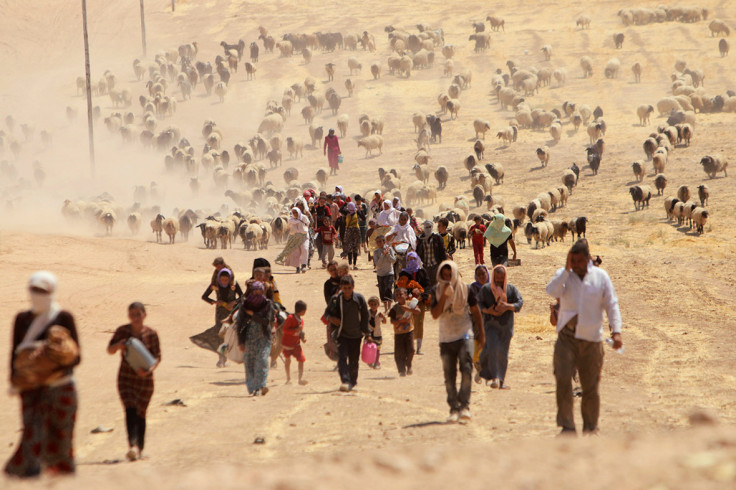Yazidi Refugee Made Mountain Goat Suckle her Two-Month-Old Baby to Survive

A Yazidi refugee, trapped in the mountains near the Iraqi city of Sinjar, has told a Channel 4 reporter that she got a mountain goat to suckle her two-month-old baby to ensure her newborn's survival when her own breast milk ran out.
The unnamed woman was trapped by militants on the mountain in northern Iraq with tens of thousands other Yazidi refugees for as long as ten days.
Channel 4 foreign affairs correspondent Jonathan Rugman, speaking from the city of Dahuk last night, said: "I met a woman who had just come into Iraq from Syria, and she was caring a two-month-old baby. And I said to her, well, how did you both survive on the mountain? And she said, well, my milk did run out, and I got a mountain goat to suckle my two-month-old baby in order to keep the boy alive."
The reporter went on to describe the baby as "healthy" as he met the woman while she was receiving food and water from an aid helicopter in the Sinjar mountains.
"The baby who was screaming a pretty - I think, a healthy scream, in the sense that the baby is alive, and the baby has made it. But it seems they are so desperate, and the sense of abandonment is very great, I think."
He implored Britons to understand the desperation felt by the Yazidi people.
"Yazidi refugees are so desperate that they walk down the mountain into Syria, of all places, and are then escorted by Kurdish fighters around the big circle, away from the jihadist positions, back into Iraq", Rugman said.
Members of the religious sect fled to the mountains after fighters from Islamic State (IS) seized the town of Sinjar. The United Nations warned on Tuesday that the persecuted civilians are still in vital need of "life saving assistance".
Aid helicopters, including one provided by the RAF, have provided food and water supplies to the Yazidi people this week. It is understood that one helicopter crashed on Tuesday following a mechanical failure and the desperation of the Yazidis, which saw many of them trying to climb aboard.
Rugman was in an aid helicopter when another one crashed. Speaking from the city of Dahuk last night he said: "I've since spoken to the governor of Dohuk, who is the senior official here. And he told me that the reason the helicopter crashed was that Yazidi refugees on Mount Sinjar were clinging to it.
"They were desperate to try and get on it, and they managed to bring the helicopter down.
"Alissa Rubin of the New York Times, who was on board the helicopter, was injured. She is OK. And the pilot has been killed. And it's the same pilot who flew me on a similar aid flight on a similar helicopter yesterday."
The Yazidis are a 4,000-year-old minority sect. Up to half a million of them (there are an estimated 700,000 worldwide) lived in the northern part of Iraq until last Sunday when Islamic State militants forced out the Kurdish forces guarding the region.
Militants gave the Yazidi people an ultimatum of converting to Islam, paying the "jizya" tax on non-believers, leaving or being killed.
Islamic State, which considers the Yazidis as "devil worshipers" has executed hundreds of residents since then, while an estimated 40,000 people fled to the Sinjar mountains.
Meanwhile, reports emerged on Saturday that hundreds of Yazidi women had been captured by the IS militants and had been taken as sex slaves.
© Copyright IBTimes 2025. All rights reserved.





















